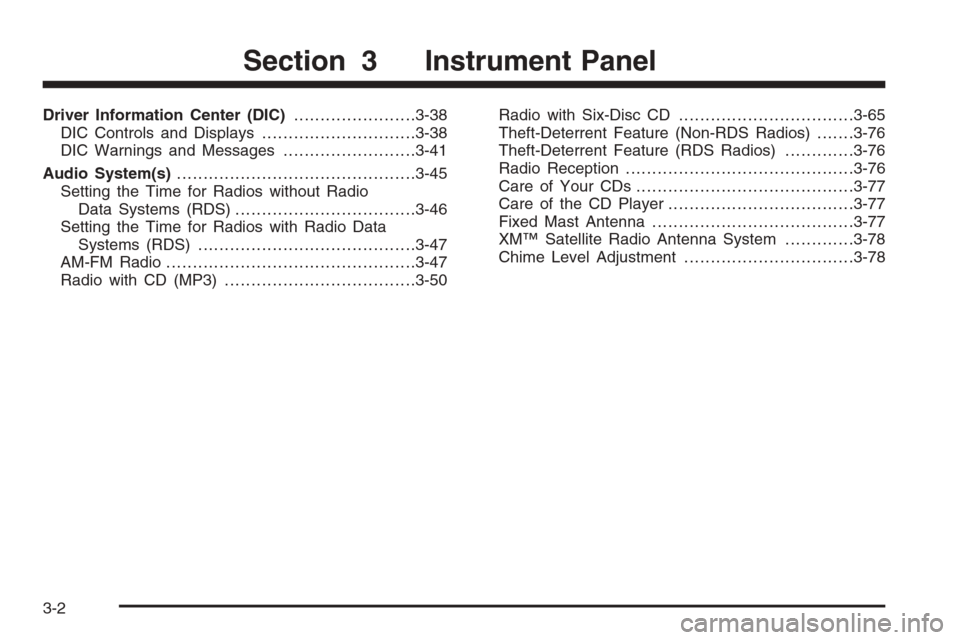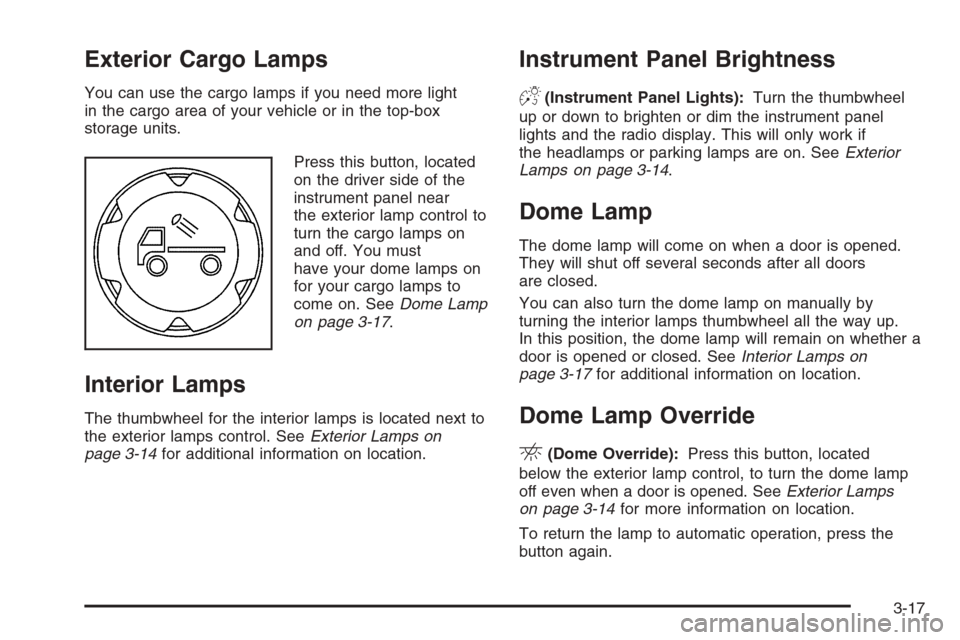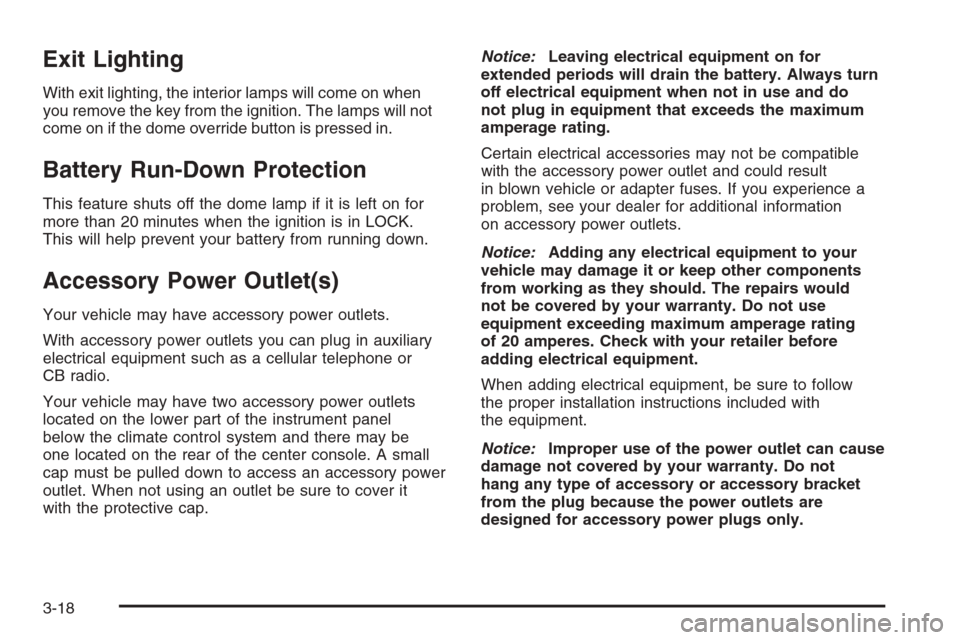2006 CHEVROLET COLORADO radio
[x] Cancel search: radioPage 79 of 434

Airbags should never be regarded as anything more
than a supplement to safety belts, and then only in
moderate to severe frontal or near-frontal collisions for
the driver’s and right front passenger’s frontal airbags,
and only in moderate to severe side collisions for side
impact airbags.
What Will You See After an
Airbag In�ates?
After a frontal airbag in�ates, it quickly de�ates,
so quickly that some people may not even realize the
airbag in�ated. Roof-mounted side impact airbags
de�ate more slowly and may still be at least partially
in�ated minutes after the vehicle comes to rest.
Some components of the airbag module — the steering
wheel hub for the driver’s airbag, the instrument
panel for the right front passenger’s airbag or the
ceiling of your vehicle near the side windows — may
be hot for a short time. The parts of the airbag that
come into contact with you may be warm, but not too
hot to touch. There will be some smoke and dust coming
from the vents in the de�ated airbags. Airbag in�ation
does not prevent the driver from seeing out of the
front windshield or being able to steer the vehicle,
nor does it stop people from leaving the vehicle.
{CAUTION:
When an airbag in�ates, there is dust in the
air. This dust could cause breathing problems
for people with a history of asthma or other
breathing trouble. To avoid this, everyone in
the vehicle should get out as soon as it is
safe to do so. If you have breathing problems
but cannot get out of the vehicle after an
airbag in�ates, then get fresh air by opening a
window or a door. If you experience breathing
problems following an airbag deployment,
you should seek medical attention.
Your vehicle has a feature that may automatically
unlock the doors (if equipped with power door locks),
turn the interior lamps on, �ash the hazard warning
�ashers, and turn off the radio when the airbag in�ates
(if battery power is available). You can lock the doors
again by using the door lock. The interior lamps
and hazard warning �ashers will deactivate after
approximately 15 minutes. You can use the radio
controls to adjust the radio.
1-73
Page 91 of 434

There is a double-sided
key that can be used for
the ignition, all door
locks, and the tailgate.
When a new vehicle is delivered, the dealer provides
the owner with a pair of identical keys and a key
code number.
The key code number tells your dealer or a quali�ed
locksmith how to make extra keys. Keep this number
in a safe place. If you lose your keys, you will be able
to have new ones made easily using this number.
Your dealer should also have this number.
Notice:If you ever lock your keys in your vehicle,
you may have to damage the vehicle to get in.
Be sure you have spare keys.
If you ever do get locked out of your vehicle call the
GM Roadside Assistance Center. SeeRoadside
Assistance Program on page 7-6.Remote Keyless Entry System
If the vehicle has the keyless entry system, it operates
on a radio frequency subject to Federal Communications
Commission (FCC) Rules and with Industry Canada.
This device complies with Part 15 of the FCC Rules.
Operation is subject to the following two conditions:
1. This device may not cause interference.
2. This device must accept any interference received,
including interference that may cause undesired
operation of the device.
This device complies with RSS-210 of Industry Canada.
Operation is subject to the following two conditions:
1. This device may not cause interference.
2. This device must accept any interference received,
including interference that may cause undesired
operation of the device.
Changes or modi�cations to this system by other than
an authorized service facility could void authorization to
use this equipment.
2-3
Page 106 of 434

If you have an automatic transmission, the ignition
switch cannot be turned to LOCK unless the shift lever
is in PARK (P).
Notice:Using a tool to force the key from the
ignition switch could cause damage or break the
key. Use the correct key and turn the key only
with your hand. Make sure the key is all the way in.
If it is, turn the steering wheel left and right while
you turn the key hard. If none of this works,
then your vehicle needs service.
ACC (ACCESSORY) (B):This is the position in
which you can operate your electrical accessories or
items plugged into the accessory power outlets.
On automatic transmission vehicles, this position
unlocks the ignition. On manual transmission vehicles,
it unlocks the ignition and steering wheel. Use this
position if your vehicle must be pushed or towed.
ON (C):This is the position that the switch returns
to after you start your engine and release the switch.
The switch stays in ON when the engine is running.
But even when the engine is not running, you can use
ON to operate your electrical accessories and to display
some instrument panel cluster warning and indicator
lights. The transmission is also unlocked in this position
on automatic transmission vehicles.START (D):This is the position that starts the engine.
When the engine starts, release the key. The ignition
switch will return to ON for normal driving.
When the engine is not running, ACC and ON allow you
to operate your electrical accessories, such as the
radio or items plugged into the accessory power outlets.
A warning tone will sound if you open the driver’s
door when the ignition is in ACC or LOCK and the key
is in the ignition.
Retained Accessory Power (RAP)
Your vehicle has Retained Accessory Power (RAP)
which will allow certain features of your vehicle
to continue working for up to 20 minutes after the
ignition key is turned to LOCK.
Your radio, wipers and power windows will work when
the ignition key is in ON or ACC. Once the key is turned
from ON to LOCK, these features will continue to
work for up to 20 minutes or until a door is opened.
2-18
Page 136 of 434

Driver Information Center (DIC).......................3-38
DIC Controls and Displays.............................3-38
DIC Warnings and Messages.........................3-41
Audio System(s).............................................3-45
Setting the Time for Radios without Radio
Data Systems (RDS)..................................3-46
Setting the Time for Radios with Radio Data
Systems (RDS).........................................3-47
AM-FM Radio...............................................3-47
Radio with CD (MP3)....................................3-50Radio with Six-Disc CD.................................3-65
Theft-Deterrent Feature (Non-RDS Radios).......3-76
Theft-Deterrent Feature (RDS Radios).............3-76
Radio Reception...........................................3-76
Care of Your CDs.........................................3-77
Care of the CD Player...................................3-77
Fixed Mast Antenna......................................3-77
XM™ Satellite Radio Antenna System.............3-78
Chime Level Adjustment................................3-78
Section 3 Instrument Panel
3-2
Page 149 of 434

Headlamps on Reminder
If a door is open, a reminder chime will sound when
your headlamps or parking lamps are manually turned
on and your key is out of the ignition. To turn off
the chime, turn the headlamp switch to off and then
back on. In the automatic mode, the headlamps turn off
once the ignition is in LOCK.
If your vehicle was �rst sold in Canada and the parking
lamps are turned on manually, the DRL will stay on.
Daytime Running Lamps (DRL)
Daytime Running Lamps (DRL) can make it easier for
others to see the front of your vehicle during the day. DRL
can be helpful in many different driving conditions, but
they can be especially helpful in the short periods after
dawn and before sunset. Fully functional daytime running
lamps are required on all vehicles �rst sold in Canada.
The DRL system will come on when the following
conditions are met:
The ignition is on.
The exterior lamps control is in AUTO.
The transmission is not in PARK (P) if you have
an automatic transmission.
The light sensor determines it is daytime.Your vehicle will have either the parking lamps or
reduced intensity low beams used as the DRL.
When the DRL are on, only those lamps will be on.
The taillamps, sidemarkers, and other lamps will not
be on. The instrument panel will not be lit up either.
When it begins to get dark, the headlamps will
automatically switch from DRL to the regular headlamps.
As with any vehicle, you should turn on the regular
headlamp system when you need it.
Automatic Headlamp System
When it is dark enough outside, your automatic
headlamp system will turn on your headlamps at the
normal brightness along with other lamps such as
the taillamps, sidemarker, parking lamps, roof marker
lamps and the instrument panel lights. The radio
lights will become more dim when the headlights are
off compared to when the headlights are on.
Your vehicle has a light sensor located on the top of
the instrument panel. Be sure it is not covered, or
the system will be on whenever the ignition is on.
The system may also turn on your headlamps when
driving through a parking garage, heavy overcast
weather or a tunnel. This is normal.
3-15
Page 151 of 434

Exterior Cargo Lamps
You can use the cargo lamps if you need more light
in the cargo area of your vehicle or in the top-box
storage units.
Press this button, located
on the driver side of the
instrument panel near
the exterior lamp control to
turn the cargo lamps on
and off. You must
have your dome lamps on
for your cargo lamps to
come on. SeeDome Lamp
on page 3-17.
Interior Lamps
The thumbwheel for the interior lamps is located next to
the exterior lamps control. SeeExterior Lamps on
page 3-14for additional information on location.
Instrument Panel Brightness
D(Instrument Panel Lights):Turn the thumbwheel
up or down to brighten or dim the instrument panel
lights and the radio display. This will only work if
the headlamps or parking lamps are on. SeeExterior
Lamps on page 3-14.
Dome Lamp
The dome lamp will come on when a door is opened.
They will shut off several seconds after all doors
are closed.
You can also turn the dome lamp on manually by
turning the interior lamps thumbwheel all the way up.
In this position, the dome lamp will remain on whether a
door is opened or closed. SeeInterior Lamps on
page 3-17for additional information on location.
Dome Lamp Override
E(Dome Override):Press this button, located
below the exterior lamp control, to turn the dome lamp
off even when a door is opened. SeeExterior Lamps
on page 3-14for more information on location.
To return the lamp to automatic operation, press the
button again.
3-17
Page 152 of 434

Exit Lighting
With exit lighting, the interior lamps will come on when
you remove the key from the ignition. The lamps will not
come on if the dome override button is pressed in.
Battery Run-Down Protection
This feature shuts off the dome lamp if it is left on for
more than 20 minutes when the ignition is in LOCK.
This will help prevent your battery from running down.
Accessory Power Outlet(s)
Your vehicle may have accessory power outlets.
With accessory power outlets you can plug in auxiliary
electrical equipment such as a cellular telephone or
CB radio.
Your vehicle may have two accessory power outlets
located on the lower part of the instrument panel
below the climate control system and there may be
one located on the rear of the center console. A small
cap must be pulled down to access an accessory power
outlet. When not using an outlet be sure to cover it
with the protective cap.Notice:Leaving electrical equipment on for
extended periods will drain the battery. Always turn
off electrical equipment when not in use and do
not plug in equipment that exceeds the maximum
amperage rating.
Certain electrical accessories may not be compatible
with the accessory power outlet and could result
in blown vehicle or adapter fuses. If you experience a
problem, see your dealer for additional information
on accessory power outlets.
Notice:Adding any electrical equipment to your
vehicle may damage it or keep other components
from working as they should. The repairs would
not be covered by your warranty. Do not use
equipment exceeding maximum amperage rating
of 20 amperes. Check with your retailer before
adding electrical equipment.
When adding electrical equipment, be sure to follow
the proper installation instructions included with
the equipment.
Notice:Improper use of the power outlet can cause
damage not covered by your warranty. Do not
hang any type of accessory or accessory bracket
from the plug because the power outlets are
designed for accessory power plugs only.
3-18
Page 163 of 434

If the word OFF or the off symbol is lit on the airbag
status indicator, it means that the passenger sensing
system has turned off the right front passenger’s frontal
airbag. SeePassenger Sensing System on page 1-74
for more on this, including important safety information.
If, after several seconds, all status indicator lights
remain on, or if there are no lights at all, there may
be a problem with the lights or the passenger sensing
system. See your dealer for service.
{CAUTION:
If the off indicator and the airbag readiness
light ever come on together, it means that
something may be wrong with the airbag
system. If this ever happens, have the vehicle
serviced promptly, because an adult-size
person sitting in the right front passenger
seat may not have the protection of the
frontal airbag. SeeAirbag Readiness Light
on page 3-26.
Battery Warning Light
This light will come on
brie�y when you start the
vehicle, as a check to
show you it is working;
then it should go out.
If it stays on, or comes on while you are driving, you
may have a problem with the electrical charging system.
Have it checked right away. Driving while this light is
on could drain your battery and result in a vehicle that
may stall. SeeDIC Warnings and Messages on
page 3-41for more information.
If you must drive a short distance with the light on,
be certain to turn off all your accessories, such as the
radio and climate control system.
3-29